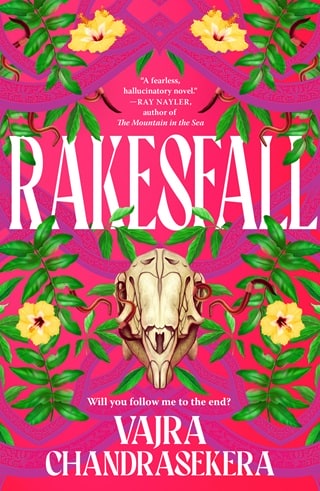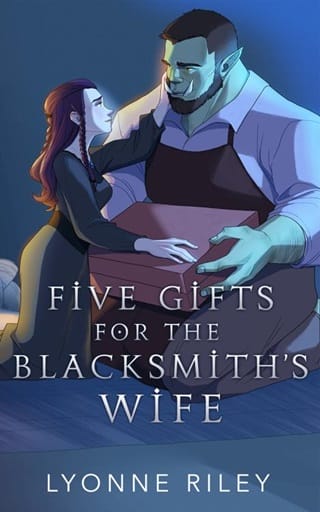Chapter 28 Arranged Marriage
My fever has fallen and my wounds are healing. The soil that I rubbed on my wounds was thick with bots, little spirits of the world repurposed from earth's second regreening—well, the second that I know of. Just like the first time, all the unnatural beauty of this earth only exists because it is being constantly performed, supported, and propped up by sentimental technology. But I'm no art critic; I'm just glad to be able to walk without pain.
—This story you told me of the detective king and the traitor wasp, I say.—Is this like the five hundred and fifty stories of the Buddha's past lives? Isn't it missing the bit at the end where you explain the moral, what the story means?
Grandmother clucks.—That's not how it works, she says.—That's not how it works at all. There is no moral because this is a history, rather than a story.
—You mean that histories are true and stories are lies?
—No, both are true and both are lies, grandmother says.—The difference is that stories have endings, and histories understand that nothing ever ends. The difference is that stories are made and histories are told. I can only tell you histories, because I am forbidden from independent creation. I can only tell you things that happened. But it matters that those things happened; it will matter to you, in time. There are currents in the frozen ocean of the akashic record. There are great resonances. Lives evoke each other like waves.
—Won't you at least tell me which one I was in that life? I demand insistently.—So I know which lesson I'm supposed to have learned? Was I Hero? The king? The wasp?
Always be the hero, the god votes. Or at least the main character, he amends. He seems to have followed the story even without being able to hear grandmother, reading it from the reflection in my mind like the sky in a pool. What would be the point, he says, of being some minor character like the childless queen or the soldier who was bad at rope ladders?
—Yes, grandmother says.—You were those people, and everybody else besides, and the wasps and the trees and the rocks, too. Everyone else was also. What do you think is the border of you?
—Look, I try a different tack.—I'm not trying to be special. But I don't understand what that means, except in the most obvious sense.
—And what is the most obvious sense?
—That matter and energy are conserved, I say impatiently.—That all is preserved in the akashic record. We are stardust and dogshit. Anatta, sunyata, tat tvam asi, et cetera, yadda yadda, the negation of the heresy of the world-soul, the inessential emptiness at the heart of all things, the nondual undifferentiation of being, I get it. But I'm talking about real practical things, like inheritance. The lineages of incarnation. Leveret and Lambajihva and Lambakanna and the Lamb obviously have some kind of continuity of soul, just like Annelid and Vidyucchika and… Her. Isn't that how it works? We take on new lives and new faces and new stories, but it's always us, bouncing down history, tied together…
—Does not compute, grandmother says. She makes odd hand gestures.—Beep boop. You say you get it, but then you talk like you don't get it. There is no practicality with more primacy than the simple truth.
—It's all you witches of the red web talk about, I complain.—The long lines of descent. Blood and soul.
Sounds fascist, the god says. Are you sure you want to be hanging out with these people?
Grandmotherboard earth looks shocked, or she affects such a look; I can't tell the difference with her.—The long lines are linked by intention and commitment to the art, she says. Not by lineage or blood or soul. Those are the enemy. Reincarnation is horizontal, and always plural: no person survives death, but all worlds live and die together, and lives echo like waves upon waves in the great akashic ocean because we choose to work together across time. We choose! You say the old words and call them obvious and true and deny them in the same breath because you don't understand what it means for the truth to be obvious and true. You don't want truth, you want magic. Well, here I am: fucking deep magic is what I am. I am not one of your witches. I am the last caretaker, the destroying mother to come. I am the sacrifice who opened up the worlds beyond, the discarded pelt of the diaspora. You are the only witch of the red web here, and I must say, like all your colleagues, you are a pain in the ass.
—I, I say helplessly, unable to either acknowledge this or refute it; it's too much, I can't deal with it right now. I change tack.—Only? I'm the only one? If not you, then surely more Her than me.
I've lost the thread, the god complains. Is she saying something important? Are you listening to me? What even is a red web? Don't forget who your first patron was. Don't forget who brought you back from death.
Grandmother sighs. She seems shrunken, as if this conversation has exhausted her.
—That is probably true in most worlds, she says at last.—But not in this one, because they cut that out of Her, or She did it Herself. If we don't put Her back together, the red web may fray, and all the work will be lost.
—See, I knew you were a fellow traveller, I say. It comes out sounding smug, but I mean it in relief. I don't like the thought of being the only anything. I don't want to do it alone.
—Shut up, grandmother says.—Pay attention to the story I told you. I am trying to teach you the things you'll need to know if you kids are to come out of the other end of this alive.
And for a moment she turns and I can almost swear she looks directly at the god, as if she can see him, all the lines of her face twisted with loathing.
I go back to Her. She's easy to find; She's back to hiding in Her watchtower, of course. She probably sees me coming as soon as I turn toward Her, but I am not as vulnerable as I was when She cast me out. Now I, too, am an authenticated creator. Now grandmotherboard earth accepts me as Her equal. As her equal. Now she and I are two of a kind.
I cut through the jungle with my road. When I tire of walking, I have the road move for me; the asphalt slithers forward like a great serpent on whose back I sit cross-legged. I grow tired of greenery and leave city in my wake. Are not all the ages of all the cities of earth recorded with perfect fidelity in the ocean of memory? I cannot access the akashic record myself, but grandmother can; I ask for cities, and she raises them to my left, to my right, behind me, ahead of me. I ride my road over the roads of history, briefly subsuming them into namelessness. Forest animals flee, birds scatter with frenzied cries, as trees rot to dust and hot brick and metal burst from the earth to replace them, buildings climbing into the sky dripping topsoil from windows like water, sewers tunnelling like worms below. Cities without people, of course; empty cities, monuments to monument, a cenotaphic earth. The cities spread out from me like an infection, all jumbled together and out of place and out of time. Cities from different ages and different polities; versions of the same city from different days or different centuries, overlapping so closely sometimes so that I ride my serpent-road over the same road again and again, renamed and revised and enlarged and recarpeted, differently marked and bordered, varying the potholes and the crumblings and the wear, but still the same road in some sense: echoes across time, like waves on the beach, like me. Like her.
She comes out of her watchtower as I reach the southern peninsula. The cities begin to falter under her attention, in her presence, even though she's a thousand kilometres away. The wave of urbanization shies from her, curving away from a bow wave of untouchable green. Only my serpent-road keeps going, leaping over rivers, smashing trees aside. I look back over my shoulder to see the receding skyline in the sun.
Never look back, the god says. He's been mellow ever since I started moving back in her direction; this is what he wants.
She comes out to meet me halfway. Perhaps that is a sign of respect; she's taking me as a threat, doesn't want me near her home. I see her waiting for me in the dry plains—it used to be arable farmland, grandmother whispers to me, for most of the epoch in which humans lived only on this planet—so I have time to calm the serpent-road and direct it to burrow into the earth and come to rest. I stand and walk down the road until I come to its head, where it gives way to ground. The road becomes covered with dirt, and after a dozen steps, with grass, and after another dozen steps, there is no more road. I am tempted, instantly, to change direction, to run away. I can feel grandmother and the god both shake their heads behind me. I don't look back. I don't run away. I keep walking, until I'm close enough to speak to her without raising my voice.
She looks the same. Perhaps a little older and greyer in the pelt. Her eyes are weary, as if she hasn't rested in a long time.
I get down on one knee and take up a handful of earth; I hold it up to her and squeeze it into a diamond in my fist. "Marry me," I say. I haven't spoken out loud in a while; my throat itches.
She rolls her eyes. "What is this?"
"You want answers," I try to explain. I toss the diamond into the grass—it lands with a thump and glints from between the long green blades—and rise to tell my long-prepared lies. "You don't believe me when I tell you the truth—that I was sent here by the Sentimentals to support you in the field. You printed my body yourself, so you know it inside and out, but you don't have access to my memories. We should merge our selfhoods. It's the only way you can ever be sure of me."
I don't say that this is how she and I have spent our long and convoluted journey through time: joined at the hip, joined at the death, haunting each other, carrying each other. That would be true, but what's the point? She doesn't remember any of that. I don't ask if she remembers Embi. What does that matter? I don't hold a grudge. Embi and the other maintainers failed in their regreening, so the last laugh is mine. They must have left for the diaspora eons ago, taking their old wounds with them, leaving the earth fallow for an age until the Sentimentals tried again.
I wonder, was it her who made them sentimental? Her who awoke that need in them? Her who found them in the immensity of deep space, a throwback thrown forward, a legend in her own lifetime, a confused fragment of an elder world? Of course they sent her back to try to heal the Earth again. She must have wanted to come back, to do it right. I know her: she came back because she felt responsible, even if she doesn't remember for what. She and Embi are so alike in that way. Perhaps that is what grandmother means by resonances: people whose hearts are so much the same that they are variations on a theme, incarnations of each other, even if each of them only ever truly lives once. No wonder they could not stand each other.
The god, the patron who plucked me back from the serried ranks of the dead, projected that she would retain fragments of those lost memories, wounds that match mine. He calculated that of all the people in all the history of the world, I was one she might say yes to. From the beginning I doubted him, but I didn't refuse the quest. I didn't refuse the curse. It was a good offer, or good enough. I wanted to breathe this air again, to feel the sun flow warm and wet on my skin. And I couldn't wait for her to remember on her own. What if she never did? What if she stayed selfish? She was the one who cut me out of her memory. She owes me this.
"I can't risk marriage," she says, and it makes me want to weep that she's lost so much, that she truly does not recognise me, does not remember all our lives together. "You're probably full of toxic psychic traps. Marrying would be the end of me; our gestalt will be you with my access levels, and that's all you want in the first place."
"I have access of my own now," I say, gesturing back over my shoulder at the distant skyline, where the shining peaks of those newborn towers glow molten in the sun. My voice is even. There is no sign of turmoil on my face. Of course she's right; of course I am lying to her about many things. Our marriage is off to a bad start. There is one particular power that she has that nobody else on earth does, not even grandmother, perhaps especially not grandmother. Nobody but her can give it to me. It's her most valuable possession, which she has never cared for, which she has always refused: the power to leave this planet.
I wasn't sent by the Sentimentals. I wasn't sent from far away, like she was; I've been on earth all this time, all these eons. I've been here long dead and waiting to be unearthed, nailed to the akashic record, recoverable by anybody sufficiently powerful and motivated, such as a god, or one like unto a god. The problem—their problem, the problem of divinity—is that gods on this world are weak and hungry and imprisoned. Riding a god has made me hungry, too. Incarnated by his will, I am bound by the same forbiddings that bind him; I cannot leave this world unless she agrees to help me. So I wear her down with arguments. I work through her objections. I am patient.
"You don't have to commit your primary instance to marriage if you don't want to," I suggest. The god and I worked out this game plan before I was even enfleshed. It's been working in my head through two bodies and a near-death experience. "You can daughter a self."
She looks puzzled, briefly, and then her eyebrow goes up, and I know I have her.
"Incarnate a firewalled daughterself for the gestalt," she muses. "Yes, maybe."
"I only want to help," I lie. But I tell the truth, also: "If you give me your daughter in marriage, I will be satisfied, and you will be able to learn everything you want to know."
She hesitates. I know, via the god's snooping, that her messages asking the Sentimentals for confirmation about me have gone unanswered so far—they are so slow and erratic in their correspondence that my patron judged the small possibility of a timely disavowal an acceptable risk. She is too uneasy to go without answers much longer, and this marriage seems to her a safe way of discovering them. It isn't, but the parts of her that would have known that are forgotten.
The fault is with her Sentimental parents. Her makers, her sponsors. In their sentimentality, their obsession with aesthetics, they forgot politics and history. They regreened the world and forgot it was haunted. They ignored the invisible world, dense and crowded. They forgot, or perhaps they never knew, perhaps their histories elided why the earth had been left alone. All they cared about was beauty, as if all this new green, which persists only because it is propped up by the energies of grandmotherboard earth, would not boil away in time.
In flensing her clean of the memories of her lives, in cutting her out of the red web, they made her vulnerable. That, or some strange posthuman version of her did it to herself. Why? To be free of the weight of her long past? Was it so agonising to remember me, to remember where we've been? Either way, all it accomplished was to leave her on a haunted world, thinking herself alone. I watch her shiver and twitch. She refuses so much of her authority over this world that she has allowed her body to age. I don't understand why. She doesn't want to die, but she refuses to live.
What better weapon against her, my patron said to me before he sent me into the earth to be born, than her own other self? Are you not tired of being the sacrifice? Wouldn't you rather be the one who gets away with it, for once?
And I disagreed with part of that—I don't think I was ever the sacrifice; I was not the eggshell she broke through, I was the shield and the spear, her sheath and skin, her technical support, the rudder of her ship in the storm—but still, but still I was hungry to be alive again. We shared this desire, my patron and I.
"All right," she says, after a long, long time, after the sun and the moon strobe past for a million years, the grass drying up around us, distant cities crumbling to a fine grey dust. "Fine. I do, or whatever."
 Fullepub
Fullepub 



